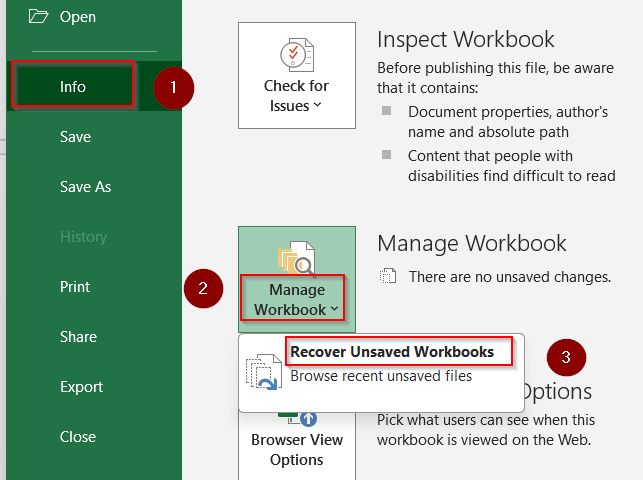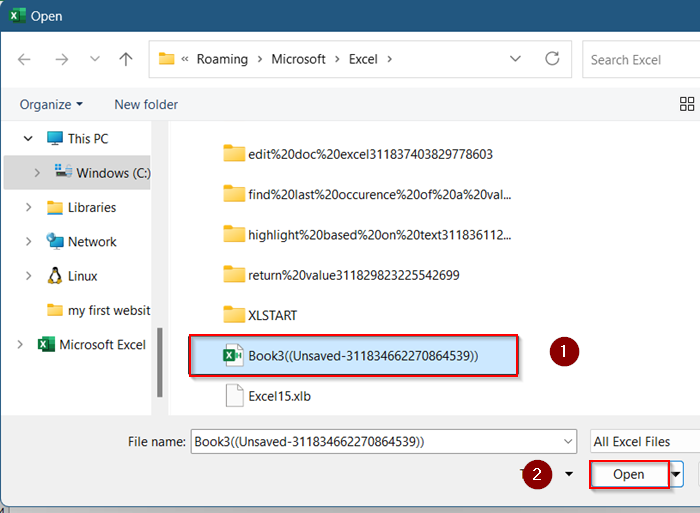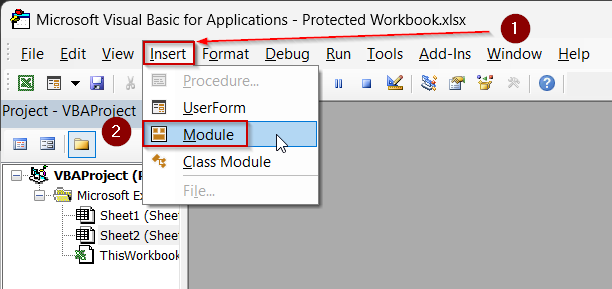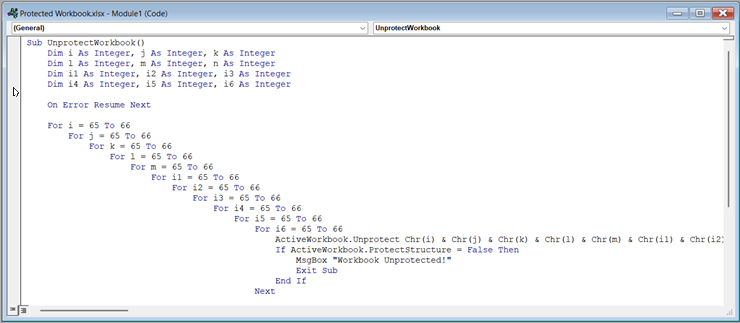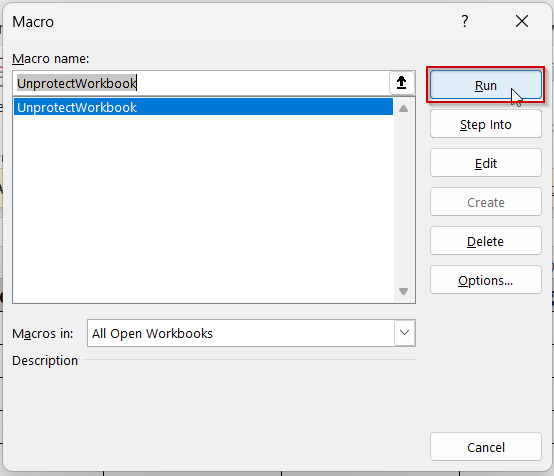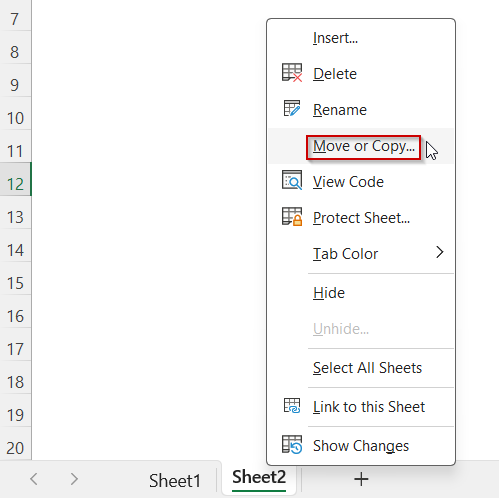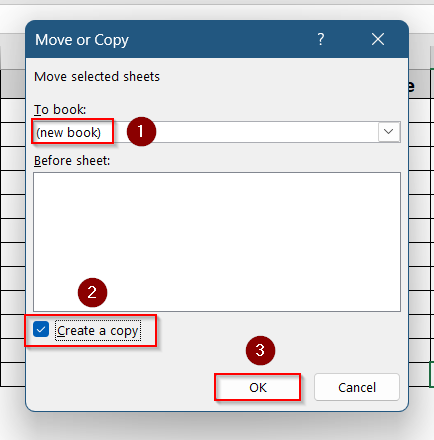Losing or forgetting the password to an Excel file can be frustrating, especially if the file contains important business or personal data. While Excel offers powerful protection options, it doesn’t provide a built-in way to recover lost passwords.
In this article, you’ll learn several methods to recover or regain access to a protected Excel file using manual techniques and what to do if you can’t recover it at all. These solutions apply to Excel 2013, 2016, 2019, 2021, and Microsoft Office 365.
Steps to recover Excel file password by saving as xls format:
➤ Go to File >> Info.
➤ Click on Manage Workbook >> Recover Unsaved Workbooks.
➤ Select an earlier version without password protection and click Open.
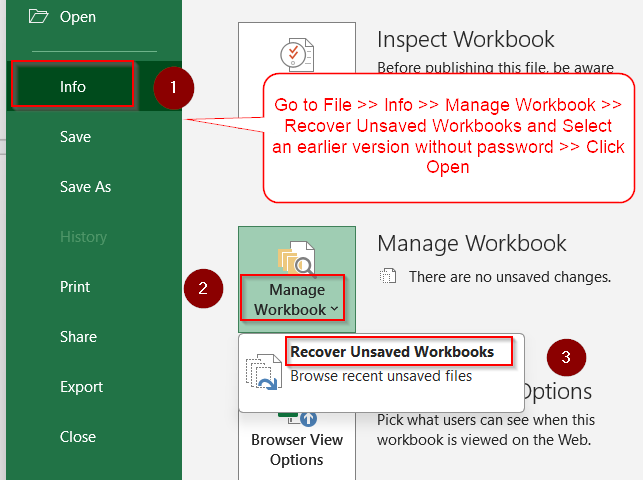
Try Known or Common Passwords First
If you recently protected the file and simply forgot the exact password, start with this basic approach.
Steps:
➤ Try variations of your usual passwords (with or without capital letters or symbols).
➤ Check if Caps Lock is on or off.
➤ Look through saved password entries in your browser or password manager.
➤ Try company default passwords if it’s a shared or legacy file.
➤ Ask colleagues or past collaborators if they remember it.
This simple step works more often than you’d think, especially with older files.
Use Backup or AutoRecover Versions
If the file was recently modified, you may have a non-password-protected version saved elsewhere.
Steps:
➤ Open Excel and go to File >> Info.
➤ Click Manage Workbook >> Recover Unsaved Workbooks.
➤ Check OneDrive, cloud backups, or shared folders.
➤ Look in File History or Windows Backup (if enabled).
➤ Restore an earlier version by clicking Open if it wasn’t password-protected.
This is a great workaround if you edited and saved the file recently without a password.
Apply VBA to Recover Excel Workbook Password
Forgetting your Excel workbook password can feel like hitting a dead end especially when you’re locked out of critical data. Fortunately, if your file is protected only at the workbook level (not encrypted), there’s still a way to regain access using VBA code.
This method works best on older Excel versions and simple password protections. Even if the code does not recover the actual password, it can remove the protection allowing you to edit the workbook.
Steps:
➤ Open the protected workbook.
➤ Press Alt + F11 to open the Visual Basic for Applications (VBA) editor.
➤ In the editor, go to Insert >> Module to add a new module.
➤ Paste the following code into the module window:
Sub UnprotectWorkbook()
Dim i As Integer, j As Integer, k As Integer
Dim l As Integer, m As Integer, n As Integer
Dim i1 As Integer, i2 As Integer, i3 As Integer
Dim i4 As Integer, i5 As Integer, i6 As Integer
On Error Resume Next
For i = 65 To 66
For j = 65 To 66
For k = 65 To 66
For l = 65 To 66
For m = 65 To 66
For i1 = 65 To 66
For i2 = 65 To 66
For i3 = 65 To 66
For i4 = 65 To 66
For i5 = 65 To 66
For i6 = 65 To 66
ActiveWorkbook.Unprotect Chr(i) & Chr(j) & Chr(k) & Chr(l) & Chr(m) & Chr(i1) & Chr(i2) & Chr(i3) & Chr(i4) & Chr(i5) & Chr(i6)
If ActiveWorkbook.ProtectStructure = False Then
MsgBox "Workbook Unprotected!"
Exit Sub
End If
Next
Next
Next
Next
Next
Next
Next
Next
Next
Next
Next
MsgBox "Failed to unprotect the workbook."
End Sub➤ Close the VBA editor and return to Excel.
➤ Press Alt + F8 , select UnprotectWorkbook, and click Run.
If the workbook is not heavily encrypted, the macro will remove the protection.This method is more effective on Excel 2016, 2013, and 2010 files (.xls or early .xlsx).
Save Workbook as XLS (Older Format)
If you’re looking for ways on how to recover an Excel file password, one lesser-known trick involves saving the file in an older format. Converting your .xlsx file to the older .xls format can sometimes strip away workbook protection, especially for structure or sheet-level passwords.
While this won’t work for encrypted files that require a password to open, it can help remove protection in simpler cases without needing the original password.
Steps:
➤ Open the protected .xlsx file.
➤ Go to File >> Save As.
➤ Choose the .xls format from the file type dropdown.
➤ Save the file.
➤ Open the .xls file to check if protection is removed.
Note:
This method might reduce functionality and formatting since .xls is an older format.
Copy Contents to a New Workbook
If you’re locked out of certain features but can still view the sheets, copying the contents to a new file can help bypass workbook-level restrictions, useful when trying to recover access without needing the original password.
Steps:
➤ Open the protected workbook.
➤ Right-click on each sheet tab, select Move or Copy.
➤ Choose (new book) and check Create a copy.
➤ Click OK to copy the sheet to a new workbook.
➤ Save the new workbook. It will not have the original protection.
Note:
This method does not work if individual sheets are also password protected.
Frequently Asked Questions
Can I recover a password-protected Excel file without using any software?
Yes, you can try manual methods like VBA scripts or copying contents to a new workbook, especially if the protection is not heavily encrypted.
Can I use the “Save As XLS” trick to unlock a file?
Yes, saving an .xlsx file as an older .xls format may strip certain protections, particularly workbook structure locks, though it won’t work for all cases.
Can I recover a password on Excel for Mac?
Most VBA-based or Windows tools won’t work on Mac. You may need to use a Windows environment or cloud-based tools compatible with your Mac Excel files.
Wrapping Up
In this tutorial, we explored multiple ways on how to recover an Excel file password from simple guessing techniques to advanced macros. Whether you’re locked out of a sheet or a full workbook, there’s almost always a workaround or solution. Feel free to download the practice file and share your feedback.

